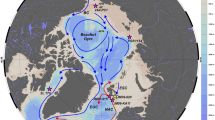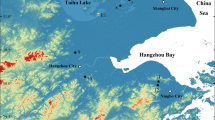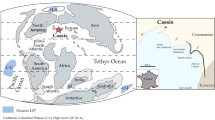Abstract
LOW-LYING areas of northern Alaska along the shores of the Arctic Ocean and the Bering Sea, as well as the basin of the Yukon River, were not glaciated during the Pleistocene1. During times of glacial maxima these areas were extended by eustatic lowering of sea-level and included a wide land platform connecting Alaska with Asia, the Bering land bridge2. The land connexion was last severed about ten thousand years ago2.
This is a preview of subscription content, access via your institution
Access options
Subscribe to this journal
Receive 51 print issues and online access
$199.00 per year
only $3.90 per issue
Buy this article
- Purchase on Springer Link
- Instant access to full article PDF
Prices may be subject to local taxes which are calculated during checkout
Similar content being viewed by others
References
Flint, R. F., Glacial and Pleistocene Geology (Wiley, New York, 1957).
Hopkins, D. M., Science, 129, 1519 (1959).
63° 29′ N., 170° 06′ W., Board on Geographic Names, U.S. Dept. Int. Decision List 6202 (1962).
Livingstone, D. A., Ecol., 36, 587 (1955).
Colinvaux, P. A., Ph.D. thesis, Duke University (Univ. Microfilms, Ann Arbor, Michigan, 1962).
Author information
Authors and Affiliations
Rights and permissions
About this article
Cite this article
COLINVAUX, P. A Pollen Record from Arctic Alaska reaching Glacial and Bering Land Bridge Times. Nature 198, 609–610 (1963). https://doi.org/10.1038/198609a0
Issue Date:
DOI: https://doi.org/10.1038/198609a0
Comments
By submitting a comment you agree to abide by our Terms and Community Guidelines. If you find something abusive or that does not comply with our terms or guidelines please flag it as inappropriate.



